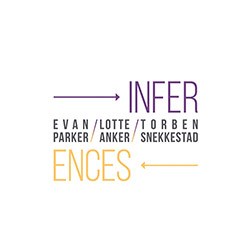
Three saxophonists -- Evan Parker, Lotte Anker, and Torben Snekkestad -- all on soprano sax plus Anker on tenor and Snekkestad on trumpet, in a primarily reed trio performing live in in Copenhagen, Denmark at KoncertKirken Blagards Plads, in two highly interactive improvisations that explore harmonic interaction, interference, and tonal intersections; fascinating!
Out of Stock
Reordered on 7/14/2023 Reordered on 9/26/2023 Reordered on 12/10/2023 Reordered on 2/20/2024 Reordered on 2/23/2024 Reordered on 8/7/2024 Reordered on 11/10/2024
Quantity in Basket: None
Log In to use our Wish List
Shipping Weight: 3.00 units
Sample The Album:
Evan Parker-soprano saxophone
Lotte Anker-soprano saxophone, tenor saxophone
Torben Snekkestad-soprano saxophone, trumpet
Click an artist name above to see in-stock items for that artist.
UPC: 5905279364523
Label: Listen! Foundation (Fundacja Sluchaj!)
Catalog ID: FSR 14 | 2019
Squidco Product Code: 28041
Format: CD
Condition: New
Released: 2019
Country: Poland
Packaging: Cardboard Gatefold
Recorded live at KoncertKirken Blagards Plads, in Copenhagen, Denmark, on September 24th, 2016, by John Fomsgaard.
"Legendary British saxophonist Evan Parker, and two great improvisers from Denmark Lotte Anker and Torben Snekkestad. Three reed's masters from different generations in beautiful performance where logic, philosophy and emotions build astonishing space."-FSR
Artist Biographies
• Show Bio for Evan Parker "Evan Parker was born in Bristol in 1944 and began to play the saxophone at the age of 14. Initially he played alto and was an admirer of Paul Desmond; by 1960 he had switched to tenor and soprano, following the example of John Coltrane, a major influence who, he would later say, determined "my choice of everything". In 1962 he went to Birmingham University to study botany but a trip to New York, where he heard the Cecil Taylor trio (with Jimmy Lyons and Sunny Murray), prompted a change of mind. What he heard was "music of a strength and intensity to mark me for life ... l came back with my academic ambitions in tatters and a desperate dream of a life playing that kind of music - 'free jazz' they called it then." Parker stayed in Birmingham for a time, often playing with pianist Howard Riley. In 1966 he moved to London, became a frequent visitor to the Little Theatre Club, centre of the city's emerging free jazz scene, and was soon invited by drummer John Stevens to join the innovative Spontaneous Music Ensemble which was experimenting with new kinds of group improvisation. Parker's first issued recording was SME's 1968 Karyobin, with a line-up of Parker, Stevens, Derek Bailey, Dave Holland and Kenny Wheeler. Parker remained in SME through various fluctuating line-ups - at one point it comprised a duo of Stevens and himself - but the late 1960s also saw him involved in a number of other fruitful associations. He began a long-standing partnership with guitarist Bailey, with whom he formed the Music Improvisation Company and, in 1970, co-founded Incus Records. (Tony Oxley, in whose sextet Parker was then playing, was a third co-founder; Parker left Incus in the mid-1980s.) Another important connection was with the bassist Peter Kowald who introduced Parker to the German free jazz scene. This led to him playing on Peter Brötzmann's 1968 Machine Gun, Manfred Schoof's 1969 European Echoes and, in 1970, joining pianist Alex von Schlippenbach and percussionist Paul Lovens in the former's trio, of which he is still a member: their recordings include Pakistani Pomade, Three Nails Left, Detto Fra Di Noi, Elf Bagatellen and Physics. Parker pursued other European links, too, playing in the Pierre Favre Quartet (with Kowald and Swiss pianist Irene Schweizer) and in the Dutch Instant Composers Pool of Misha Mengelberg and Han Bennink. The different approaches to free jazz he encountered proved both a challenging and a rewarding experience. He later recalled that the German musicians favoured a "robust, energy-based thing, not to do with delicacy or detailed listening but to do with a kind of spirit-raising, a shamanistic intensity. And l had to find a way of surviving in the heat of that atmosphere ... But after a while those contexts became more interchangeable and more people were involved in the interactions, so all kinds of hybrid musics came out, all kinds of combinations of styles." A vital catalyst for these interactions were the large ensembles in which Parker participated in the 1970s: Schlippenbach's Globe Unity Orchestra, Chris McGregor's Brotherhood of Breath, Barry Guy's London Jazz Composers Orchestra (LJCO) and occasional big bands led by Kenny Wheeler. In the late 70s Parker also worked for a time in Wheeler's small group, recording Around Six and, in 1980, he formed his own trio with Guy and LJCO percussionist Paul Lytton (with whom he had already been working in a duo for nearly a decade). This group, together with the Schlippenbach trio, remains one of Parker's top musical priorities: their recordings include Tracks, Atlanta, Imaginary Values, Breaths and Heartbeats, The Redwood Sessions and At the Vortex. In 1980, Parker directed an Improvisers Symposium in Pisa and, in 1981, he organised a special project at London's Actual Festival. By the end of the 1980s he had played in most European countries and had made various tours to the USA, Canada, Australia, New Zealand and Japan. ln 1990, following the death of Chris McGregor, he was instrumental in organising various tributes to the pianist and his fellow Blue Notes; these included two discs by the Dedication Orchestra, Spirits Rejoice and lxesa. Though he has worked extensively in both large and small ensembles, Parker is perhaps best known for his solo soprano saxophone music, a singular body of work that in recent years has centred around his continuing exploration of techniques such as circular breathing, split tonguing, overblowing, multiphonics and cross-pattern fingering. These are technical devices, yet Parker's use of them is, he says, less analytical than intuitive; he has likened performing his solo work to entering a kind of trance-state. The resulting music is certainly hypnotic, an uninterrupted flow of snaky, densely-textured sound that Parker has described as "the illusion of polyphony". Many listeners have indeed found it hard to credit that one man can create such intricate, complex music in real time. Parker's first solo recordings, made in 1974, were reissued on the Saxophone Solos CD in 1995; more recent examples are Conic Sections and Process and Reality, on the latter of which he does, for the first time, experiment with multi-tracking. Heard alone on stage, few would disagree with writer Steve Lake that "There is, still, nothing else in music - jazz or otherwise - that remotely resembles an Evan Parker solo concert." While free improvisation has been Parker's main area of activity over the last three decades, he has also found time for other musical pursuits: he has played in 'popular' contexts with Annette Peacock, Scott Walker and the Charlie Watts big band; he has performed notated pieces by Gavin Bryars, Michael Nyman and Frederic Rzewski; he has written knowledgeably about various ethnic musics in Resonance magazine. A relatively new field of interest for Parker is improvising with live electronics, a dialogue he first documented on the 1990 Hall of Mirrors CD with Walter Prati. Later experiments with electronics in the context of larger ensembles have included the Synergetics - Phonomanie III project at Ullrichsberg in 1993 and concerts by the new EP2 (Evan Parker Electronic Project) in Berlin, Nancy and at the 1995 Stockholm Electronic Music Festival where Parker's regular trio improvised with real-time electronics processed by Prati, Marco Vecchi and Phillip Wachsmann. "Each of the acoustic instrumentalists has an electronic 'shadow' who tracks him and feeds a modified version of his output back to the real-time flow of the music." The late 80s and 90s brought Parker the chance to play with some of his early heroes. He worked with Cecil Taylor in small and large groups, played with Coltrane percussionist Rashied Ali, recorded with Paul Bley: he also played a solo set as support to Ornette Coleman when Skies of America received its UK premiere in 1988. The same period found Parker renewing his acquaintance with American colleagues such as Anthony Braxton, Steve Lacy and George Lewis, with all of whom he had played in the 1970s (often in the context of London's Company festivals). His 1993 duo concert with Braxton moved John Fordham in The Guardian to raptures over "saxophone improvisation of an intensity, virtuosity, drama and balance to tax the memory for comparison". Parker's 50th birthday in 1994 brought celebratory concerts in several cities, including London, New York and Chicago. The London performance, featuring the Parker and Schlippenbach trios, was issued on a highly-acclaimed two-CD set, while participants at the American concerts included various old friends as well as more recent collaborators in Borah Bergman and Joe Lovano. The NYC radio station WKCR marked the occasion by playing five days of Parker recordings. 1994 also saw the publication of the Evan Parker Discography, compiled by ltalian writer Francesco Martinelli, plus chapters on Parker in books on contemporary musics by John Corbett and Graham Lock. Parker's future plans involve exploring further possibilities in electronics and the development of his solo music. They also depend to a large degree on continuity of the trios, of the large ensembles, of his more occasional yet still long-standing associations with that pool of musicians to whose work he remains attracted. This attraction, he explained to Coda's Laurence Svirchev, is attributable to "the personal quality of an individual voice". The players to whom he is drawn "have a language which is coherent, that is, you know who the participants are. At the same time, their language is flexible enough that they can make sense of playing with each other ... l like people who can do that, who have an intensity of purpose." " ^ Hide Bio for Evan Parker • Show Bio for Lotte Anker "Lotte Anker. Soprano- alto- and tenor saxophone. Composer. Lotte Anker is born 1958 in Copenhagen. As a child and young she studied classical piano but took up the saxophone and improvised music in 1980, primarily influenced through the music of John Coltrane and Wayne Shorter but also the more experimental jazzscene in Scandinavia at that time. She studied music at the Copenhagen University from 1980-84 and in the 80'ties par- ticipated in several courses and workshops lead by e.g.: Joe Henderson, David Liebman, John Tchicai, Marilyn Mazur, David Murray. As a composer she is mostly selftaught but has a degree in composition fromRhytmic Music Conservatory, Cph. Compositionclass led by Bob Brookmeyer and with assisting guest teachers Pelle Gudmundsen-Holmgren, Svend Hvidtfeldt-Nielsen ao. In 1988 she formed her own quartet with pianoplayer Mette Petersen:Lotte Anker/Mette Petersen Quartet. In 92 the quartet transformed into a quintet with Norwegian trumpetplayer Nils-Petter Molvær.In 95 she became a member of the free improvising trio Anker,Friis,Poulsen (with Hasse Poulsen, guitar and Peter Friis-Nielsen: bass) 1996-2013 co-leader (together w/ trombonist/composer Ture Larsen) of the 12-piece orchestra Copenhagen Art Ensemble. Cph. Art Ensemble is performing new music and besides playing new Danish music, the band has done projects/tours with e.g.: Tim Berne, Django Bates, John Tchicai, Marilyn Mazur, The Zapolski Quartet, Mats Gustafsson, Marc Ducret. In 97 L. Anker formed a trio with Marilyn Crispell and Marilyn Mazur. The collaboration with M. Crispell has continued through the years in various formations: as duo, trio and quartet. In 2003 the trio : anker,taborn,cleaver was formed with pianoplayer Craig Taborn and drummer Gerald Cleaver. In 2006 the quintet Sonographic July (LA, Tim Berne, altosax, Sylvie Courvoisier, pno, Ikue Mori, electr, Tom Rainey, dr) was established and also a trio: Anker, Courvoisier, Mori. In 2010 LA was invited to do a special project at Huddersfield Contemporary Musicfestival & Wundergrund Festival which resulted in the forming of the 8-piece-group: What River Ensemble. WRE includes: Phil Minton, LA, Anna Klett, Garth Knox, Jesper Egelund, Fred Frith/Kim Myhr, Ikue Mori & Chris Cutler. Other recent group collaborations : Anker, Leandre, Strid (w/ Joelle Leandre & Raymond Strid), Quartet (w/ Johannes Bauer, Clayton Thomas, Paul Lovens). Anker, Frith,Mori (w/ Fred Frith & Ikue Mori) and duo w/ Fred Frith. Besides working with own groups Lotte Anker has been a member of various Danish/Scandinavian groups e.g.: Marilyn Mazurs Primi Band, Two Bass-Hit, Saxmachine (saxophonequartet), Jazzgroup 90, Art-Out, Ictus, Mokuto, Konvoj-Art. Projects/collaborations/tours with Peter Brotzmann, Miya Masaoka, Michael Formanek, Tim Berne, Marc Ducret, Dylan van der Schyff , Paal Nilssen-Love, Herb Robertson, Arve Henriksen, Anders Jormin, Sten Sandell, Andrew Cyrille, Fred Frith, Benoit Delbecq, Wilbert de Joode, Thomas Lehn, Paul Lovens, Okkyung Lee, Fred Lonberg-Holm ao." ^ Hide Bio for Lotte Anker • Show Bio for Torben Snekkestad "Torben Snekkestad was born in 1973 in Norway and now resides in Copenhagen, Denmark. Torben Snekkestad is a classically educated saxophonist, dedicated in both contemporary music and many different forms of improvisation. Alongside with his classical work, he also focuses extensively on jazz. Torben Snekkestad has premiered numerous pieces, both with his ensembles and also as a soloist with orchestras such as 'The Norwegian Radio Orchestra' and 'Athelas Sinfonietta Copenhagen'. He is the soprano-saxophonist of the 'Copenhagen Saxophone Quartet' - one of Denmark's most prominent chamber music ensembles, their records and concerts being internationally acclaimed. He also plays contemporary music in another Danish chamber music ensemble, '4 Elements'. Duo projects include those with composer Jens Hørsving such as 'Among Machines' and with saxophonist Rolf Erik Nystrøm. Torben Snekkestad also gives solo-saxophone concerts which include compositions by composers such as Berio, Stockhausen and Scelsi, along side with Scandinavian compositions and also his own improvisations/compositions. As a jazz musician Torben Snekkestad's main projects are: 'Conic Folded' - a solo, duo and trio project which feature many of his own compositions. He performs with such groups as Spring (a Danish free jazz quartet),Tri O`Trang (a Norwegian trio) and Trygve Seim Orchestra(a Norwegian band on the ECM label). Torben Snekkestad's wide ranging musical interests have led him into numerous musical settings over the years, ranging from the music of the baroque and classical chamber music genres to rock, folk music and free jazz. As a composer he writes mainly for his own ensembles, as well as for other projects. Torben Snekkestad currently teaches classical saxophone at 'The Royal Danish Academy of Music' and at various workshops. He has toured extensively throughout Europe, the USA, Russia, East Asia and Argentina." ^ Hide Bio for Torben Snekkestad
4/9/2025
Have a better biography or biography source? Please Contact Us so that we can update this biography.
4/9/2025
Have a better biography or biography source? Please Contact Us so that we can update this biography.
4/9/2025
Have a better biography or biography source? Please Contact Us so that we can update this biography.
Track Listing:
1. Inferences 26:59
2. Kairos 14:01
Improvised Music
Jazz
Free Improvisation
Trio Recordings
European Improvisation, Composition and Experimental Forms
London & UK Improv & Related Scenes
Parker, Evan
Collective Free Improvsation
Staff Picks & Recommended Items
Search for other titles on the label:
Listen! Foundation (Fundacja Sluchaj!).


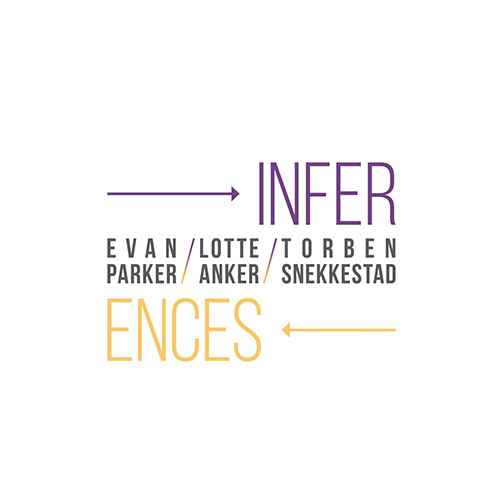

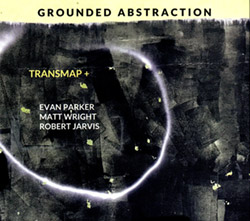




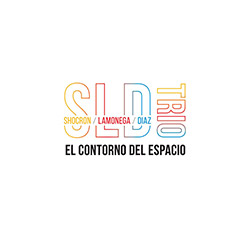
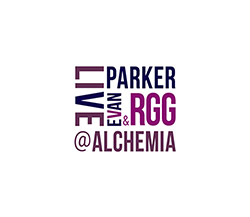
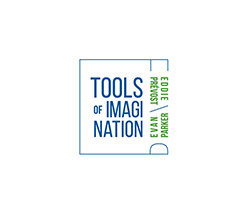
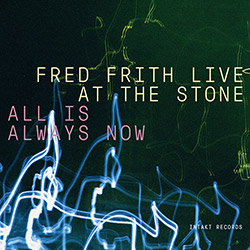




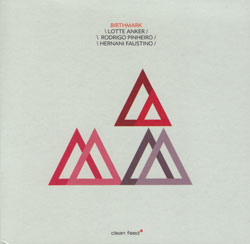
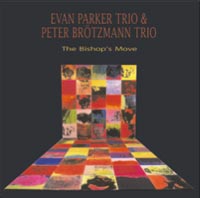



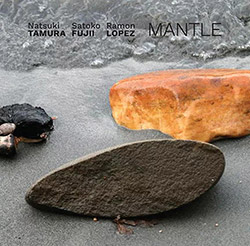
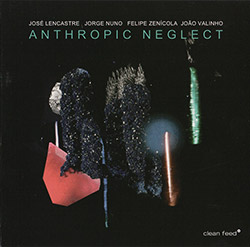

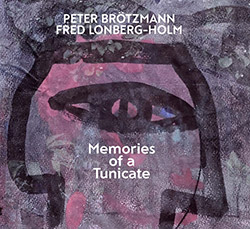
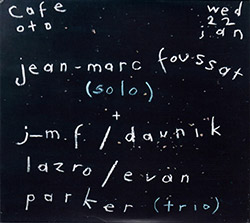
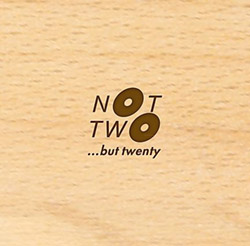
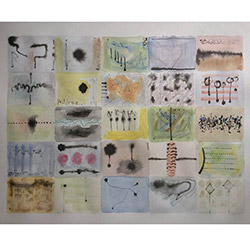



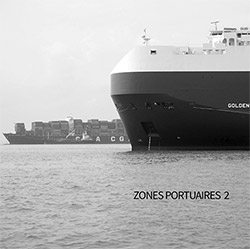
![111 (Michelle / Villamil): Live at Opus 40 [CASSETTE]](https://www.teuthida.com/productImages/misc4/35986.jpg)
![del Pino, Francisco / Charlotte Mundy: The Sea [CASSETTE]](https://www.teuthida.com/productImages/misc4/35987.jpg)

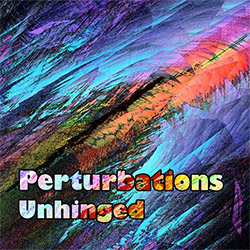

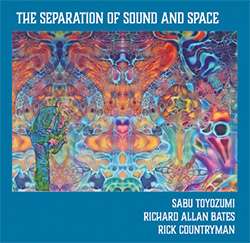


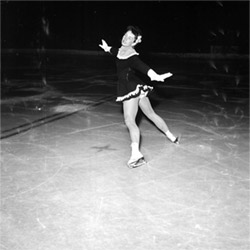
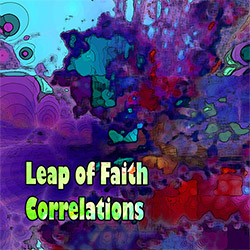

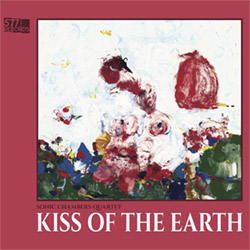

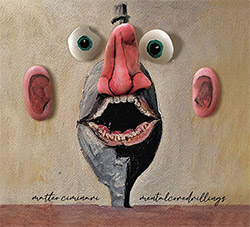
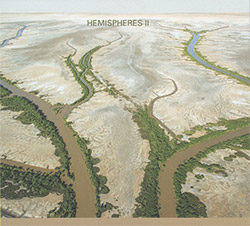
![Niblock, Phill / Anna Clementi / Thomas Stern: Zound Delta 2 [VINYL]](https://www.teuthida.com/productImages/misc4/34623.jpg)
![Yoko, Ono / The Great Learning Orchestra: Selected Recordings From Grapefruit [2 CDs]](https://www.teuthida.com/productImages/misc4/35841.jpg)

![Brotzmann, Peter / John Edwards / Steve Noble / Jason Adasiewicz: The Quartet [2 CDs]](https://www.teuthida.com/productImages/misc4/35975.jpg)
![Brotzmann, Peter / John Edwards / Steve Noble / Jason Adasiewicz: The Quartet [VINYL 2 LPs]](https://www.teuthida.com/productImages/misc4/35976.jpg)
![Thomas, Pat: The Solar Model of Ibn-Al Shatir [VINYL]](https://www.teuthida.com/productImages/misc4/36044.jpg)
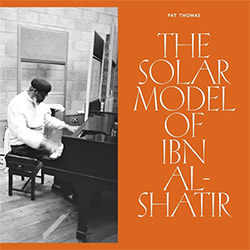



![Rodrigues, Ernesto / Nuno Torres / Guilherme Rodrigues: Whispers In The Moonlight - In Seven Movements [2CDs]](https://www.teuthida.com/productImages/misc4/35765.jpg)



![Cocks, Laura: FATHM [VINYL]](https://www.teuthida.com/productImages/misc4/36055.jpg)













![Schindler, Udo / Sandy Ewen / Damon Smith: Munich Sound Studies Vols. 4, 5 & 6 [3 CDs]](https://www.teuthida.com/productImages/misc4/35966.jpg)
![Turbulence Orchestra & Sub-Units: Smear Out the Difficulties (Double Live) [2 CDs]](https://www.teuthida.com/productImages/misc4/36048.jpg)

![Myers, David Lee : Tin Drop Tear [BOOK w/ DOWNLOAD]](https://www.teuthida.com/productImages/misc4/36030.jpg)

![Ackerley / Prymek / Turner: All Hope With Sleeping Minds [CASSETTE]](https://www.teuthida.com/productImages/misc4/35950.jpg)








![Olencki, Weston : Pearls Ground Down To Powder [VINYL]](https://www.teuthida.com/productImages/misc4/35956.jpg)
![Myers, David Lee: Oculus [2CDs]](https://www.teuthida.com/productImages/misc4/35857.jpg)


![dustsceawung: dustsceawung [CASSETTE w/ Download]](https://www.teuthida.com/productImages/misc4/35753.jpg)




![Halls of the Machine: Atmospheres For Lovers And Sleepers [CASSETTE w/ DOWNLOAD]](https://www.teuthida.com/productImages/misc4/35806.jpg)











![Zorn, John / JACK Quartet: The Complete String Quartets [2 CDs]](https://www.teuthida.com/productImages/misc4/35609.jpg)

![Lonsdale, Eden: Dawnings [2 CDs]](https://www.teuthida.com/productImages/misc4/35480.jpg)







![Sanna, Claudio: Compositori Sardi Contemporanei II [2 CDs]](https://www.teuthida.com/productImages/misc4/35317.jpg)







![Zurria, Manuel: Fame di Vento [3 CDs]](https://www.teuthida.com/productImages/misc4/35167.jpg)

![Electric Bird Noise / Derek Roddy: 8-10-22 [CD EP]](https://www.teuthida.com/productImages/misc4/35970.jpg)








![Elephant9 : Mythical River [VINYL]](https://www.teuthida.com/productImages/misc4/34624.jpg)



![Elephant9 with Terje Rypdal: Catching Fire [VINYL 2 LPs]](https://www.teuthida.com/productImages/misc4/35355.jpg)
![Deerlady (Obomsawin, Mali / Magdalena Abrego): Greatest Hits [VINYL]](https://www.teuthida.com/productImages/misc4/34876.jpg)







![Surplus 1980: Illusion of Consistency [CD]](https://www.teuthida.com/productImages/misc4/35069.jpg)
![Staiano, Moe: Away Towards the Light [VINYL + DOWNLOAD]](https://www.teuthida.com/productImages/misc4/35037.jpg)



![Caveira (Gomes / Sousa / Abras / Ferrandini): Ficar Vivo [VINYL]](https://www.teuthida.com/productImages/misc4/34643.jpg)
![Coley, Byron: Dating Tips for Touring Bands [VINYL]](https://www.teuthida.com/productImages/misc4/17906.jpg)

![Lost Kisses: My Life is Sad & Funny [DVD]](https://www.teuthida.com/productImages/misc4/lostKissesDVD.jpg)